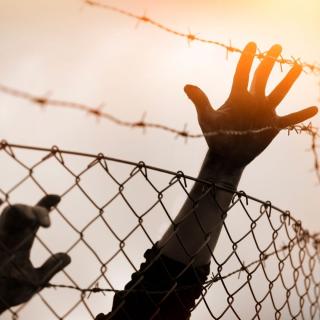Protecting Migrants Fundamental Rights
By Bruce Knotts
This post was originally sent out on December 17 via a monthly email message from Director Bruce Knotts of the Unitarian Universalist Association Office at the United Nations. Subscribe to the UU@UN email list.

The world is facing multiple crises at the same time. The fact that it’s hard to keep track of so many catastrophic situations doesn’t exempt us from facing them.
James Baldwin said, “Not everything that is faced can be changed, but nothing can be changed until it is faced.”
Yes, we have the pandemic and the chaos it causes. We have climate change, which causes more discord and destruction. We have the rise in authoritarian governments while the United States descends into a backsliding democracy. Our excessively armed world, especially the U.S., continues to pose dire threats in many forms, from school shootings to the proliferation of nuclear weapons.
We also know that systems of oppression and a societal devotion to mercenary capitalism have led to systemic exploitation of both people and planet. One inevitable outcome of this treatment is a rise in human displacement and migration that will only increase over time.
Humans are a migratory species, as are many other living creatures on this planet. We move to find food, water, safety, and freedom.
December 18 is International Migrants Day, an occasion to recognize and mobilize around protecting migrants’ fundamental human rights.
On this year’s International Migrants Day, we acknowledge the myriad ways in which these rights are being violated right now: in U.S. detention centers, at the border between Poland and Belarus, on bodies of water where souls are lost attempting to cross, seeking refuge.
The United Nations has two useful sets of recommendations that countries should incorporate into their national immigration policies. One is the Global Compact for Migration, which calls for orderly and humane immigration policies. The other is the Global Compact on Refugees, which calls for nations to share responsibility to ensure decent living conditions in refugee camps.
Migrants, refugees, and Indigenous peoples should of course lead the process for how such national policies are designed and implemented. Respect for individuals’ and communities inherent worth and dignity must be central; therefore, national governments (many of which continue to perpetrate imperialism) should not be solely entrusted with deciding migration policy.
We all know that climate change will continue displacing people; this will be the focus for the UU@UN’s 2022 Intergenerational Spring Seminar.
Please join us in April when experts from the UN, Indigenous communities and other affected populations, and our own UU leaders in the climate justice movement will coach us to be effective advocates for addressing this most human need to live in safety.
While Covid-19 rages on, we cannot afford to just focus on the pandemic and forget about the conflict, climate change, and economic injustice causing people to be displaced. We must tend to all these issues: fostering peace, creating climate justice, and advancing just migration for all.
Your support throughout 2021 has allowed the UU@UN to maintain our critical presence at the UN, monitoring all these concerns and advocating for Unitarian Universalist values. Amid the crises of the world, our connections are a source of great inspiration and strength.
Thank you for your ongoing commitment.
P.S. Last week I wrote to you about the work we do in the UU@UN to uphold human rights around the world. If you haven’t yet, please make a year-end gift now to sustain this crucial work into 2022.
The UUA Office at the United Nations is supported by the generosity of individuals like you. Donate now.